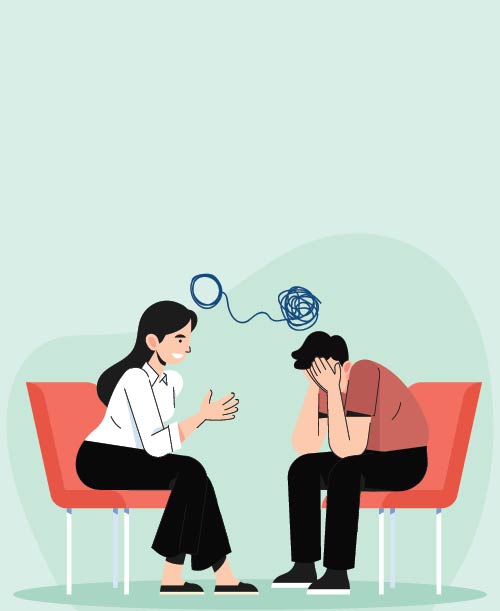Unlocking the Secrets of Mental Health And Wellness: An Overview of Counseling and Treatment Choices
Psychological health and wellness is a facility and critical element of general health. Many counseling and treatment choices exist to deal with different psychological challenges. Each technique supplies distinct benefits and approaches tailored to individual requirements. Recognizing these alternatives is essential for any person seeking to improve their psychological health. Marriage Counselling. What factors should one think about when checking out these opportunities? The solution might disclose a course to a much healthier emotion
Understanding Mental Health And Wellness and Its Relevance
Psychological health incorporates the emotional, mental, and social wellness of people, considerably affecting how they believe, feel, and act. Its value can not be overemphasized, as it influences every facet of life, consisting of partnerships, work efficiency, and total lifestyle. Individuals with excellent psychological health tend to deal with stress better, preserve healthier relationships, and make educated decisions. Conversely, bad psychological wellness can result in psychological distress, damaged functioning, and various mental conditions, which might call for professional treatment. Recognizing mental wellness is important for acknowledging the indicators of distress and the requirement for assistance. Understanding additionally promotes empathy and lowers preconception, urging people to seek aid when necessary. By focusing on mental health, neighborhoods can foster settings that support psychological well-being, eventually resulting in healthier, more resistant individuals. This structure serves as a critical action toward effective psychological health therapy and treatment choices.
Kinds Of Counseling Techniques
Therapy strategies differ widely, each tailored to satisfy the one-of-a-kind demands of individuals seeking assistance. Among the most common types are cognitive-behavioral therapy (CBT), which concentrates on recognizing and altering negative idea patterns, and person-centered treatment, which emphasizes empathy and acceptance. Psychodynamic treatment discovers previous experiences and unconscious processes to recognize existing habits, while solution-focused short therapy aims to recognize solutions instead than check out problems.Additionally, family therapy addresses relational characteristics and communication within family members, promoting much healthier interactions. Team therapy offers a common room for participants to share experiences and sustain each other. Various other techniques include existential treatment, which motivates people to locate meaning and function, and art or songs therapy, which utilizes imaginative expression as a healing device. Each approach offers distinctive strategies and ideologies, enabling clients to locate the most ideal method for their personal development and healing journeys.
Exploring Various Treatment Modalities
In the domain name of mental wellness therapy, different treatment methods supply distinctive methods to treatment. Cognitive Behavior Therapy emphasizes the link between habits and ideas, while Psychodynamic Treatment explores subconscious impacts on psychological health. Additionally, Mindfulness-Based Techniques promote present-moment recognition as a way to boost psychological regulation and total mental health.
Cognitive Behavioral Treatment
Cognitive Behavior Modification (CBT) stands apart as one of the most widely practiced and investigated techniques in mental health and wellness treatment. This approach concentrates on the affiliation between thoughts, feelings, and habits, emphasizing that changing adverse idea patterns can lead to boosted psychological well-being and behavioral adjustments. CBT is structured, typically involving a restricted variety of sessions, and aims to outfit people with practical skills to handle their symptoms. It is effective for a variety of problems, including anxiousness disorders, depression, and post-traumatic stress condition. By making use of techniques such as cognitive restructuring and direct exposure treatment, CBT promotes resilience and empowers clients to challenge difficulties head-on, making it a valuable option in the landscape of psychological health and wellness treatments.
Psychodynamic Treatment Techniques
Psychodynamic therapy techniques supply a deep exploration of the subconscious mind and its impact on habits and psychological wellness. Rooted in Freudian concept, these techniques stress the significance of early childhood years experiences and subconscious problems. Via strategies such as complimentary association, desire analysis, and transfer, people obtain understanding into their thoughts and sensations, cultivating self-awareness and understanding. This healing technique urges customers to uncover repressed feelings and unsolved problems, which can be crucial in resolving current psychological difficulties. By analyzing the interaction between present behaviors and past experiences, psychodynamic treatment intends to advertise psychological recovery and personal growth. Inevitably, it provides a framework for individuals to check out complicated internal characteristics that influence their psychological health and wellness.

Mindfulness-Based Strategies
While conventional treatments frequently concentrate on previous experiences, mindfulness-based methods prioritize present-moment understanding as a pathway to emotional well-being. These strategies, consisting of mindfulness-based cognitive treatment (MBCT) and mindfulness-based stress reduction (MBSR), urge people to involve completely with their thoughts and feelings without judgment. Professionals discover to observe their frame of minds, promoting a greater understanding of psychological triggers and reactions. This technique not only minimizes symptoms of anxiety and depression yet likewise improves total psychological resilience. By integrating mindfulness workouts, such as meditation and deep breathing, customers cultivate a feeling of tranquility and clearness. Eventually, mindfulness-based strategies empower individuals to browse life's difficulties with boosted understanding and acceptance, promoting a much healthier connection with their thoughts and emotions.
The Role of a Therapist or Therapist
A proficient therapist or counselor plays a vital duty in sustaining people through their psychological wellness trips. They provide a risk-free, non-judgmental room where clients can share their ideas and feelings freely. Cognitive Behavioural Therapy. By employing various healing techniques customized to every person's requirements, specialists help clients discover underlying issues that may add to their psychological health and wellness challenges.Therapists provide support and tools to manage anxiety, anxiety, depression, and various other emotional difficulties. Their training outfits them to recognize patterns in behavior and believed procedures, facilitating insights that bring about personal growth. They additionally promote a solid healing partnership, which is essential for effective outcomes.Moreover, therapists stay dedicated to discretion and honest standards, additional hints making sure a relying on setting. Inevitably, the duty of a therapist or therapist is to encourage individuals, motivating them to develop durability and much healthier coping strategies while guiding with life's intricacies
Exactly how to Pick the Right Counseling or Treatment Choice
Picking the ideal counseling or therapy alternative begins with reviewing specific needs. It is vital to comprehend individual difficulties and goals before discovering numerous therapy designs. This fundamental action can considerably affect the performance of the picked approach.
Evaluate Your Demands

Exactly how can Cognitive Behavioural Therapy individuals successfully evaluate their mental health and wellness needs when evaluating counseling or treatment alternatives? First, they ought to review their emotion and recognize specific problems, such as partnership, anxiety, or anxiety obstacles. Journaling can be a valuable tool for tracking thoughts and feelings in time. Additionally, people might take advantage of seeking feedback from trusted buddies or relative relating to regarded adjustments in behavior or state of mind. It is also useful to evaluate personal goals for treatment, such as improving coping skills or acquiring understanding into individual patterns. Ultimately, investigating different therapy techniques and their suitability for details demands can help in making an enlightened choice. Eventually, self-awareness plays an essential role in picking the ideal path for psychological health assistance.
Check Out Therapy Styles
While traversing the varied landscape of therapy alternatives, people should think about various designs of counseling to locate the most effective suitable for their unique needs. Cognitive Behavior Treatment (CBT) concentrates on transforming unfavorable thought patterns, while Psychodynamic Treatment checks out previous experiences and unconscious processes. Humanistic approaches emphasize individual development and self-actualization, fostering a helpful atmosphere. In addition, mindfulness-based therapies grow present-moment awareness, helping psychological regulation. For those looking for structure, Solution-Focused Brief Treatment targets particular goals and options. Group therapy provides a public setting for common experiences and support. Ultimately, individuals should reflect on their choices, convenience levels, and specific challenges, ensuring they choose a healing design that resonates with their individual trip toward psychological well-being.
Conquering Barriers to Seeking Help

The Benefits of Therapy and Treatment for Mental Wellness
Seeking assistance for mental wellness obstacles can cause considerable improvements in overall wellness. Counseling and treatment provide individuals with a risk-free room to discover their sensations and ideas, cultivating self-awareness and personal development. These specialist services gear up clients with dealing approaches and problem-solving abilities tailored to their one-of-a-kind situations.Moreover, treatment can lower signs and symptoms of anxiety, depression, and other psychological health conditions, enhancing emotional strength. Normal sessions advertise responsibility and urge individuals to establish and attain personal objectives. Via various healing methods, such as cognitive-behavioral treatment or mindfulness techniques, customers discover to reframe negative thoughts and create much healthier behaviors.Additionally, the restorative connection itself can be a resource of assistance, helping to combat seclusion and solitude. Generally, participating in counseling and treatment is a positive step toward attaining psychological health, making it possible for individuals to lead more meeting lives.
Frequently Asked Inquiries
For How Long Does Therapy or Treatment Typically Last?
The duration of therapy or therapy differs substantially, typically lasting from a couple of sessions to numerous months or years. Variables influencing this include the individual's specific requirements, the sort of treatment, and restorative goals.
What Should I Expect Throughout My Initial Session?
During the very first session, individuals can anticipate an intro, conversation of worries, and the specialist's technique. They might complete evaluations and develop goals, promoting a secure setting for open interaction and structure connection.

Exist Any Type Of Dangers Related To Treatment?
Therapy can involve dangers, such as emotional discomfort, vulnerability, or facing uncomfortable memories. While these obstacles might arise, they can additionally cause individual development and healing, making the therapeutic procedure facility yet possibly gratifying.
Exactly How Can I Tell if My Therapist Is a Good Fit?
Determining if a specialist is a great fit includes examining comfort, interaction style, and restorative approach. Positive relationship and progress in the direction of goals are indications of an ideal match, vital for effective psychological health support.
Will My Insurance Coverage Cover Counseling or Therapy Sessions?
Figuring out insurance policy coverage for therapy or therapy sessions typically requires calling the insurance coverage supplier straight. Plans vary considerably, so individuals need to verify advantages, co-pays, and any kind of essential pre-approvals prior to pursuing therapy services. Amongst the most typical kinds are cognitive-behavioral treatment (CBT), which concentrates on determining and changing adverse idea patterns, and person-centered therapy, which stresses empathy and approval. Psychodynamic therapy checks out past experiences resource and unconscious procedures to recognize present behavior, while solution-focused quick therapy aims to recognize remedies instead than check out problems.Additionally, family treatment addresses relational dynamics and interaction within families, cultivating much healthier communications. Various other strategies include existential therapy, which encourages individuals to locate significance and function, and art or music treatment, which utilizes imaginative expression as a healing device. Cognitive Behavior Therapy highlights the connection between ideas and habits, while Psychodynamic Treatment checks out subconscious influences on psychological health. Cognitive Behavioral Therapy (CBT) concentrates on changing unfavorable idea patterns, while Psychodynamic Treatment checks out subconscious processes and past experiences.